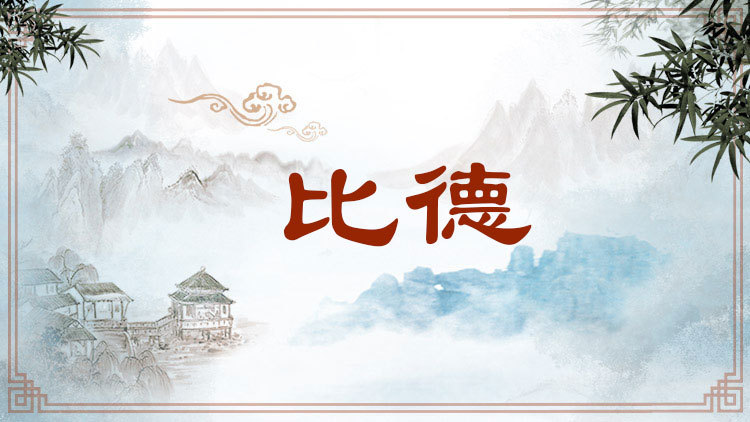比德
Virtue Comparison

用自然物包括动植物的某些特性比附人的道德品格。引申到文学审美领域,一般是用美好的事物直接比喻高尚的人格精神,将自然现象看作是人的某些精神品质的表现和象征,体现出儒家将审美与文艺道德化的思维模式。人比德于自然,意味着对自然的欣赏其实就是对人自身特别是人所具有的伦理品格的欣赏。后成为修辞与诗歌创作的一种方式。
The term means likening certain characteristics of things in nature, including plants and animals, to human virtues. When extended to the domain of literary appreciation, it generally involves likening desirable objects to a noble personality. To perceive a natural phenomenon as a reflection or symbol of human characteristics is typical of the Confucian school, which takes aesthetic quality as a moral standard for people as well as literature and arts. Likening humans to nature implies that appreciation of nature is actually appreciation of humanity itself, particularly its moral character. It later became a technique employed in rhetoric and poetry.
引例 Citations:
◎昔者君子比德于玉焉,温润而泽,仁也。(《礼记·聘义》)
从前,君子的道德人格可以和美玉相比,温润而有光泽,体现出的就是仁。
In the past, the moral integrity of a man of virtue was likened to fine jade, which is smooth, mellow, and lustrous, an exact embodiment of benevolence. (The Book of Rites)
◎及三闾《橘颂》,情采芬芳,比类寓意,乃覃及细物矣。(刘勰《文心雕龙·颂赞》)
到了屈原《橘颂》,情志和文采都极为美好,它用相类的事物比拟并寄寓作者自己的情志,又将“颂”的内容推及细微之事物了。
In Qu Yuan's "Ode to the Orange Tree," both his sentiment and literary style were highly refined. The work used similar things to analogize and convey the author's own sentiment, and extended its content into subtle things. (Liu Xie: The Literary Mind and the Carving of Dragons)
推荐:教育部 国家语委
供稿:北京外国语大学 外语教学与研究出版社
责任编辑:钱耐安





